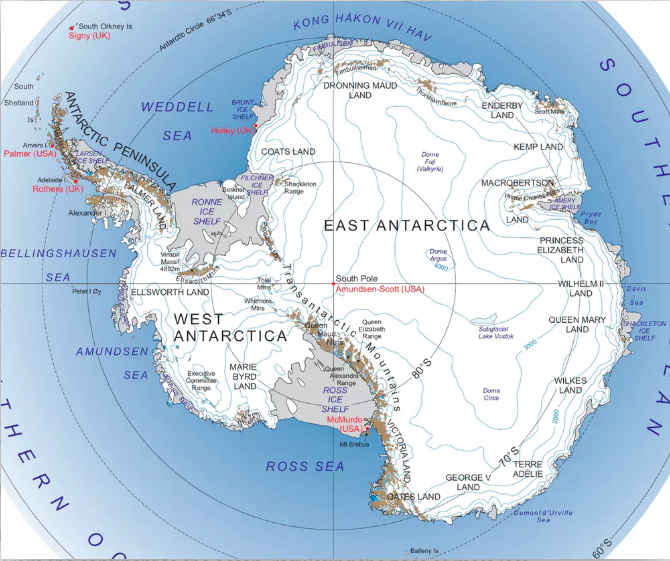After more than a year of anticipation, the clock is ticking down. On New Year’s Eve I set sail for Antarctica from Ushuaia, Argentina with 80+ women from around the world! Over the past year, we’ve gotten to know each other – through video conferencing, lengthy Facebook threads, and a few in-person meet-ups. We’ve shared stories about our lives, our passions, and our hopes for this world. We’ve been prompted to delve deep into our own stories – the stories we tell ourselves about what we can do, and what’s holding us back. And we’ve been exploring questions about our role in this world – a world that has been tumbling through what is clearly becoming the largest mass extinction in 65 million years.

Map of Antarctica (credit: NASA)
I’ve been asked what I’m looking forward to the most from this trip. Certainly, I’m eager to see Antarctica, but really, I’m eager to meet in person all of the friends I’ve made this past year. I’m eager to continue our discussions about climate, politics, society, gender roles, and the paths we take to navigate all of this at various stages of our lives. These conversations give me hope – something that I’ve had in short supply in regard to climate change over the past few years.

Homeward Bound participants on the deck of the MV Ushuaia in February 2018. (Credit: Oli Sansom)
We are in the midst of massive ecological change initiated by rising carbon in the atmosphere – carbon that was buried over the past 400+ million years ago, then pulled out of the ground and burned in the past 140 years. The polar regions have long been a bell-whether for climate change, and Antarctica, the most remote place on earth, is one of the most sensitive. Antarctica is home to the world’s largest ice sheet. It sits up to 3 kilometers thick in some places. If all of it were to melt, global sea level would rise by about 60 meters (that’s ~200 feet!). How quickly Antarctica loses it’s ice depends on more than temperature. Ice shelves along the periphery of the continent act like feet holding a mountain of ice in place. If those ice shelves lose their footing, the ice sheet will become unstable much more quickly.
We’ll be visiting the Antarctic Peninsula, which juts northward from the continent. Because of its northerly location, and the small size of the ice sheet on the peninsula, this region is the most sensitive to climate change. Loss of ice here will have a significant impact on biodiversity in this region in the next century. On this trip, we will be witnessing this transition first hand. To help protect this sensitive region, there are a number of protocols that visitors are expected to follow – namely, we need to be sure that we are not bringing with us any non-native species in the form of seeds, grasses or other organic matter stuck to our boots, packs, in the pockets of our jackets, or, in my case, stuck to my fleece pants. So, in addition to simply trying to get everything into my pack, I’m trying to ensure that everything is clean!

Trying to get all of the cat hair off my fleece pants and I turn around for ONE minute!
Beyond the science, Homeward Bound has a stellar line-up of activities for us on the ship. Strategy sessions, science talks (we are each giving a short talk), group presentations about science and the role of women in science, and lectures from faculty – both pre-recorded and in-person – will form the basis of our professional development program. I’m also thrilled that we will be joined on this trip by a global climate superstar, Ms. Christiana Figueres. Ms. Figueres is the former Executive Secretary of the UN Framework Convention on Climate Change, and was responsible for coordinating the Paris Agreement to combat climate change. I highly recommend her TED talk, if you’d like to know more.

Penguins on an iceberg (credit: Fabian Dattner)
I think I’m most excited about meeting her because she is one of the most hopeful people I’ve ever heard talk about climate change. Climate change is an overwhelming challenge – even more overwhelming when you live in a country where your head of state openly denies a scientific fact. But Ms. Figueres is optimistic. She is optimistic that climate change will force us to make the world a much better place than it’s ever been. I want her optimism.
The adventure starts in 14 days, but I will be headed off to Argentina in 3 days! I will be posting here, as frequently as I am able, until we set sail. While we are on the ship, I will be out of contact, but you can expect a set of posts from me in late January and early February. In the meantime, you can follow our progress through Homeward Bound’s social media sites (you can also follow me on Twitter and Instagram while I’m in Argentina). I’ve volunteered to write a blog post for the Homeward Bound site during the voyage, so keep your eyes open for that!
How to follow our voyage through Homeward Bound’s social media updates (click on any of these for latest updates):
Facebook, daily updates
Instagram, daily updates

The Argentinian base on the Antarctic Peninsula (credit: Fabian Dattner)
Have a fabulous time. We look forward to your posts.
LikeLike